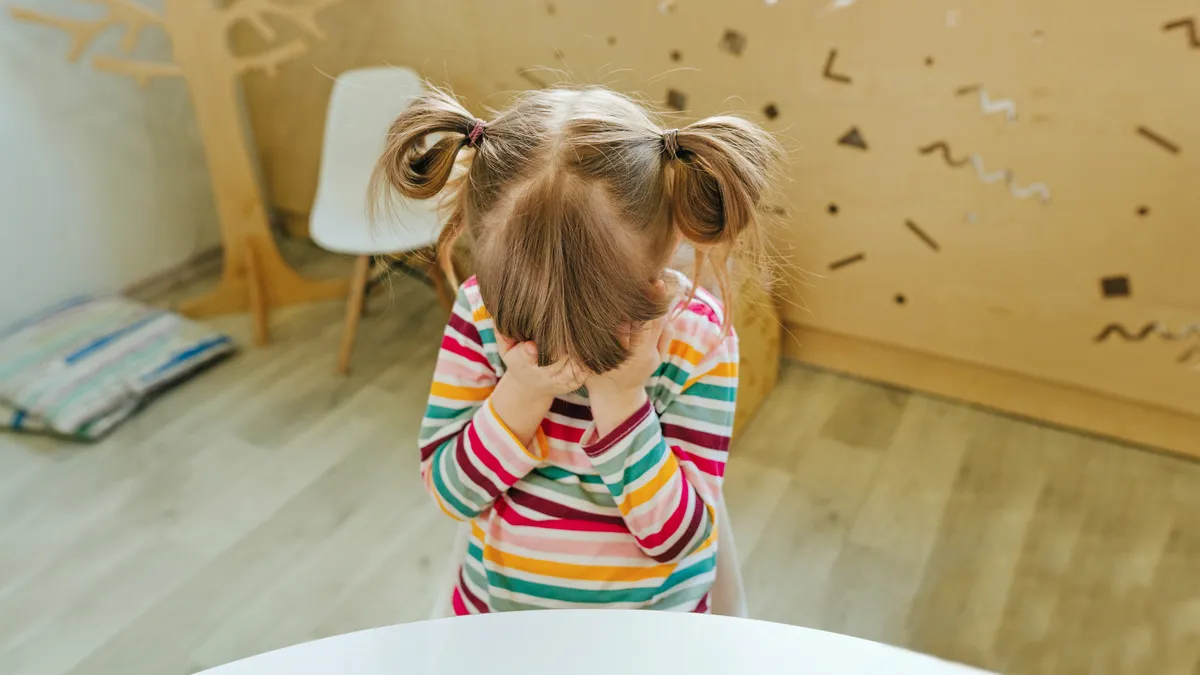Dive Brief:
- Preschool expulsions and suspensions can cause long-lasting trauma to children and families, as well as more immediate damage to children's cognitive and social development, panelists said during a webinar hosted Monday by The Hunt Institute, a nonprofit organization that aims to improve education policy.
- Simply having policies that prohibit exclusionary discipline, however, is not the solution, panelists said. Additionally, they supported better compensation and preparation for early educators, more training in cultural responsiveness and racial biases, and a stronger focus on play-based learning and social development for young children.
- As the pandemic brought more attention to the value of child care and early education, many advocates are now hopeful that long-desired reforms will gain momentum — including the elimination of preschool expulsions and suspensions.
Dive Insight:
Although removing or excluding children from early learning settings, such as child care programs and preschools, is more common than many people realize, it's difficult to cite specific data on how often this occurs, said panelist Kate Zinsser, an associate professor of psychology at the University of Illinois Chicago.
That's because there's no coordinated data system for early education. Also, removals in the early education setting are often informal, with a child's family encouraged to voluntarily withdraw from the program or a child sent home repeatedly in the middle of the day, making it difficult for working parents to find new on-the-spot child care arrangements, Zinsser said.
The National Survey of Children's Health found that about 50,000 children in preschool and child care were suspended each year and 17,000 were expelled, meaning about 250 children per day are asked to leave temporarily or permanently, Zinsser said.
"Across multiple studies, we see between 25 and 50% of programs recording excluding at least one kid every year, which means that many kindergarten classrooms are going to have kids in them who were asked to leave their prior schooling environment in some way," Zinsser said.
Panelist Tunette Powell, an assistant research professor and director of K-12 education at the Children's Equity Project at Arizona State University, gave a firsthand account of this situation. Three years old when she was expelled from a preschool program, Powell said that years later, her sons, then ages 3 and 4, were suspended a combined 12 times in 2014.
Powell, who describes herself as a Black mother in an article she wrote on the situation, said she was given different reasons for the suspensions, and none of the behaviors "were extreme to me."
"What you also have to realize when you have kids that are this young of age, they may not always be able to understand exactly what's happening, but the collective trauma amongst families and communities is so detrimental," Powell said.
She realized the pattern of suspensions in her family reflected a problem with the preschool system when a White parent told her that her child had a more serious behavior infraction at the preschool, but that parent only received a phone call from the school.
"I think that it's important for us to not only think about the individual experience of our children, but to think about the collective experience," Powell said. "I will tell you that, for me, it is something that has never gone away."
Shantel Meek, executive director of the Children's Equity Project, told webinar attendees that exclusion and harsh discipline in early education settings are not applied evenly among student groups. For instance, she said Black boys in preschool make up about 18% of the population but incur about 41% of the suspensions. Children with disabilities are also disciplined more harshly, she said.
"I think the top thing that I want to really focus on is really the anti-Black kind of racism and implicit bias that we see in some of these places," Meek said.
The panelists praised policies in some states, such as Illinois, to eliminate exclusionary discipline in early education. But in removing that option, educators need more resources to address challenging behaviors, they said.
In addition to more training and better pay for early childhood educators, families need more support for parenting strategies, the panelists said. Likewise, schools need more resources for childhood mental health screenings and interventions, as well as more capacity for data collection, they said.
Some panelists also said if they could redesign preschool, they would focus more on student-led learning through play, as well as thoughtful consideration of academic readiness skills needed and what's adding undue stress on teachers and children.
"I think play, the pedagogy, what we're actually doing with kids in the time that we have them, right, is it developmentally appropriate? Is it play-based? Or are we putting unrealistic expectations and behavioral expectations on kids?" Meek said.











